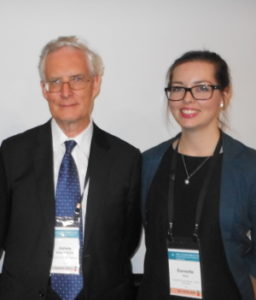

Young Scholar: Danielle Gale

Danielle Gale
Curtin University
Sponsored by the Western Australian Committee
Danielle is a PhD student at Curtin University looking to quantify the carbon footprint of broadacre livestock production in Western Australia, and subsequently identify cost-effective strategies to reduce that footprint. Climate change, sustainability and agriculture have long been areas of interest to Danielle and she completed Science and Economic degrees with the goal of working in these fields. She has a particular interest in working with developing nations, having spent time spent in such countries as a child and as an adult. Her long-term goals involve working overseas.
Conference report
Interacting with so many like-minded individuals who are already working or, like myself, have aspirations to work on the international agricultural and sustainability platforms was truly a highlight.”
How to feed a population of 9 billion by 2050? And how to do it ethically and efficiently in a world challenged by population growth, natural resource depletion, climate change, international trade restrictions and changing consumer preferences?
In her opening address at the commencement of the 2014 Crawford Fund conference, Professor Catherine Bertini introduced this core issue of food security and its related challenges. She emphasised that addressing gender inequity through the empowerment of women and the adoption of more innovative approaches in agriculture are vital solutions. This set the tone for the following day at the parliamentary conference where a number of distinguished Australian and international speakers sought not only to highlight the challenges the global community is facing but importantly, what we can and must do to combat these challenges. The reoccurring message throughout the conference was that if we are to hope to succeed in addressing food security we must acknowledge its highly integrated nature, adopt a holistic approach, and act now.
As a postgraduate researcher in the agricultural field, the conference highlighted to me the importance of the work that researchers undertake and the potential contribution of such research to the broader issues facing our global community. In particular, the call for “climate-smart agriculture”, as termed by Ms Rachel Kyte at the opening of the conference and subsequently raised in discussions, resonated deeply. This concept involves the adoption of strategies that sustainably increase the productivity of agricultural processes, enhance the resilience and adaptability of farmers, while also reducing greenhouse gas emissions and the environmental impact. Gone are the days when these three factors can be considered independently of each other. The identification and implementation of such integrated strategies is absolutely vital if we are to work toward food security and ensure that agriculture is part of the solution.
One of the most valuable outcomes of this conference was the opportunity it gave me to meet peers, researchers and others working both domestically and internationally in agricultural development. Interacting with so many like-minded individuals who are already working or, like myself, have aspirations to work on the international agricultural and sustainability platforms was truly a highlight. I was also able to gain a greater understanding of the Crawford Fund and the vital work they do in promoting international agricultural aid and research. What a collective wealth of experience and knowledge the Crawford Fund Committee members alone possess. It was a privilege to meet so many passionate and inspiring individuals.
The conference reinforced my view that international cooperation and research is vital for sustainable agricultural development and the social, economic, political and environmental benefits that run parallel with such development. The participation of all parties; from the smallholder farmers that dominate agriculture in developing nations, to the private sector, to governments is necessary if we are to transform the current system. I am very grateful to have had the opportunity to attend this conference and I will carry the insights and invaluable advice provided to me during the conference and scholar activities as I move forward in my postgraduate research and career.